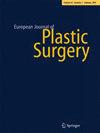使用游离内侧硬膜外动脉穿孔器(MSAP)皮瓣治疗乳腺癌相关淋巴水肿:一种 VLVT 方法
IF 0.8
Q4 SURGERY
引用次数: 0
摘要
本文章由计算机程序翻译,如有差异,请以英文原文为准。
Management of breast cancer—related lymphedema using free medial sural artery perforator (MSAP) flap: a VLVT approach
求助全文
通过发布文献求助,成功后即可免费获取论文全文。
去求助
来源期刊

European Journal of Plastic Surgery
SURGERY-
CiteScore
1.10
自引率
0.00%
发文量
93
期刊介绍:
Europe has always been an area of dynamic development in plastic surgery. Its great strength has been the lack of uniformity of this development due to differing cultures, different traditions, and differing medical and surgical philosophies. Over the recent years, these changes have been even more striking and rapid. The European Journal of Plastic Surgery creates a focal point for the input of new advances in clinical techniques and in research. It thus becomes an educational vehicle. In addition to this, the journal provides information on what is going on elsewhere in the world, and it is also willing to accept contributions from outside of Europe. Fields of interest include general plastic and reconstructive surgery, head and neck surgery, aesthetic and craniofacial surgery, hand surgery, microsurgery, treatment of bones, trauma, burn management and basic research related to all aspects of plastic surgery.Submitted articles are first evaluated by the Editor in Chief and if judged appropriate, are peer-reviewed by at least two selected experts. Reviewers may be plastic surgeons or other surgical/ medical specialists with expertise in specific areas of research. Manuscripts provisionally accepted for publication may be returned to the author for corrections or clarifications, in response to suggestions by the Editorial Board or external reviewers, prior to final acceptance. Online submission and peer review for rapid online publication are offered through the Editorial Manager System. The system creates a PDF version of the submitted article for peer review, revision and proofing. All correspondence, including the request for revisions and final decision, is managed by e-mail. Authors are guided step by step through the full process and are kept up to date on the article’s progress at every stage. Manuscripts submitted for publication must contain a statement to the effect that all human studies have been reviewed by the appropriate ethics committee and have therefore been performed in accordance with the ethical standards laid down in an appropriate version of the 1964 Declaration of Helsinki. It should also be stated clearly in the text that all persons gave their informed consent prior to their inclusion in the study. Details that might disclose the identity of the subjects under study should be omitted.Reports of animal experiments must state that the ''Principles of laboratory animal care'' (NIH publication No. 86-23, revised in 1985) were followed, as well as specific national laws (e.g. the current version of the German Law on the Protection of Animals) where applicable.Acknowledgments of people, grants, funds, etc. should be placed in a separate section before the reference list. The names of funding organizations should be written in full. Authors are also required to disclose any relationships with public or private commercial or noncommercial entities, any institutional affiliations, or any personal associations that might pose a conflict of interest.The Editors reserve the right to reject manuscripts that do not comply with the above-mentioned requirements. The author will be held responsible for false statements or for failure to fulfill the above-mentioned requirements.
 求助内容:
求助内容: 应助结果提醒方式:
应助结果提醒方式:


